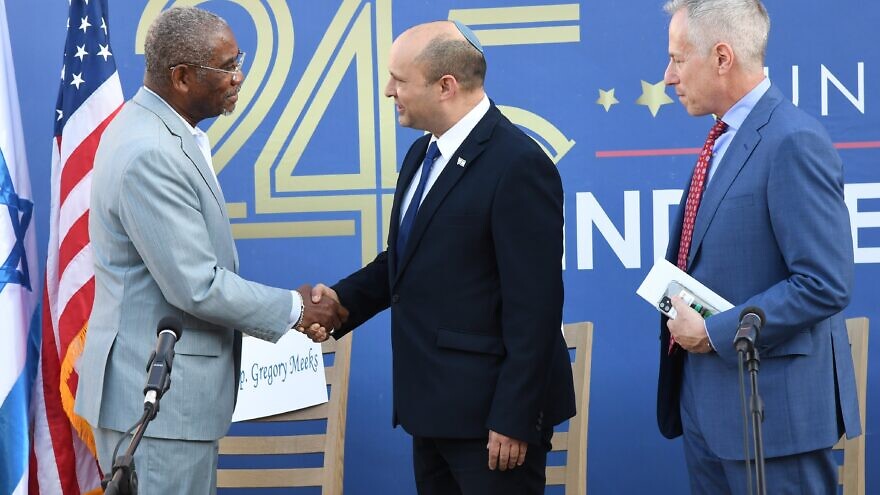A bipartisan group of members of the U.S. House of Representatives and Israeli officials celebrated Independence Day on Tuesday at a small event hosted by the U.S. embassy in Jerusalem.
Israeli Prime Minister Naftali Bennett was on hand to welcome the visitors—the first official congressional delegation to travel to a foreign country since the start of the coronavirus pandemic.
In English, Bennett welcomed the guests by recalling his upbringing in the United States.
Bennett said that the same values inspired Israel’s founding in 1948. But an even deeper connection, he said, was in the inspiration the founding fathers found in the Hebrew Bible, the Tanach, when creating the United States.
The prime minister also highlighted the ideological and racial diversity in his government and noted that he will strive to make the relationship between the two countries be bipartisan.
“You know, Israelis across the political spectrum are fundamentally pro-American. We like America. We appreciate, we admire what you’re doing. And that’s the way it ought to be also in America vis-à-vis Israel,” he said. “And I’ll challenge any attempt to make America a partisan political issue in Israel and any attempt to make Israel a partisan political issue in the United States. Our policy is bipartisan. We’re friends of everyone. Because the friendship between our two democracies will always transcend party politics.”
‘We are going to be better’
Bennett was followed at the lectern by House Foreign Affairs Committee chairman Gregory Meeks (D-N.Y.), who led the delegation for the first time as chairman of the committee.
Israel, the United States and members of Congress, affirmed Meeks, share the same values, making up an unbreakable bond between the two nations.
He said he was pleased with the bipartisan nature of the delegation, which included Reps. David Cicilline (D-R.I.), Andy Barr (R-Ky.), Abigail Spanberger (D-Va.), Sarah Jacobs (D-Calif.), Kathy Manning (D-N.C.), Nicole Malliotakis (R-N.Y.), Brad Schneider (D-Ill.) and French Hill (R-Ark.).
“When we come to Israel, we don’t come as Democrats or Republicans; we come as members of the United States Congress,” said Meeks.
Meeks commented on the composition of Bennett’s government—the most diverse in the history of Israel—saying it will make for a better tomorrow.
Meeks, the first black chairman of the Foreign Relations Committee, said he owed a debt of gratitude to Jews who stood alongside Martin Luther King Jr. and African-Americans during the heyday of the civil-rights movement, without which he would not be where he is today.
“ … People of color and people of the Jewish faith, we know what it feels like to have the world against you at times. We know what it feels like to be oppressed. And so who better to come together to lead a world and economy to say, ‘We are going to be better,’ ” he said.
Meeks concluded his speech with the reasons the delegation picked Israel as its first foreign trip.
“We’re here to make friends. We’re here to talk. We’re going to make friends with the Israelis. We’re going to make friends with the Palestinians. We’re going to make sure that we work collectively together—that Israel is safe—because we understand those who are not willing to acknowledge and understand that our friend, Israel, is here forever, those who call for its demise, will see that it is justice, and values and democracy that will long survive them, and we will make sure that they are no longer in the way of a strong Jewish state,” said Meeks.
“So let me make it plain, we’re going to lock arm-in-arm with you, Mr. Prime Minister, to make sure that Iran doesn’t get its way,” he continued. “We’re going to lock arm-in-arm with you to make sure that Hamas doesn’t get its way. We will lock arm-in-arm with you to make sure that the historic moment that is upon us with the Abraham Accords, that we get more people to join and say, ‘Israel has the right to exist, and we’re going to work with them hand-in-hand.’ ”
According to a news release on Monday, the delegation will next travel to Qatar, where it plans to address issues of mutual concern, including regional security threats and interests, in addition to the normalization agreement between Arab countries and Israel as part of the Abraham Accords.
The group will also visit the U.S. Central Command (CENTCOM) to assess the Iranian threat, America’s regional security posture and spend time with deployed military personnel.


























